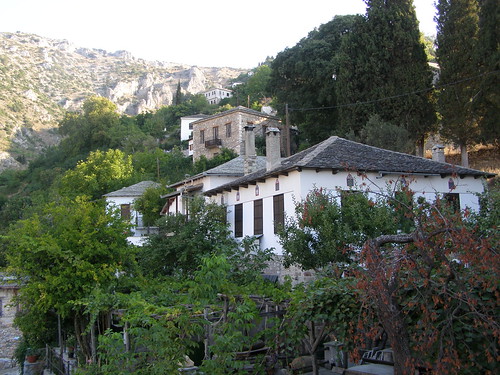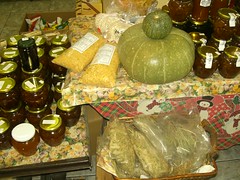It may look as though I haven't left Hania, but depending on where the stress mark is placed, Hania becomes a different place. HA-nia (not my own town of ha-NIA) is a small mountain village located in the Pelion mountain range in central Greece. It is a popular winter resort with a ski-field; in the summer, it is less popular with the (mainly Greek) tourists, who prefer (naturally) the coastal areas. How fortunate for us, as this was the perfect place to get away from the high temperatures (we were travelling during a heatwave) and the crowds.
Hania (in Pelion) gets its name from 'hani' (χάνι), meaning 'stopover inn, a place to rest', which was the original purpose of this place: a place to rest, sleep, feed and water your donkey and yourself, before continuing the long tiring journey over windy narrow roads to the other side of the Pelion mountain range. The 'hani' used to play a similar role as that of the English coaching inn. Such places existed in central locations all over Greece during the years when the donkey was an important means of transport. In Hania (Crete), for example, there were 'hania' for donkey tie-ups up until some time after the second world war.

It feels strange seeing my hometown's name in another part of Greece, especially when it isn't pronounced in the same way...
The Pelion Hania's significance may have lost its original value over time with the new transportation methods, but the ski field located close by has allowed this popular stopover to become an all-year-round resort. Hania - also (mis)spelt Chania, just like the Cretan town - is now a bustling resort village with a few hotels and restaurants built along the main road which passes through the village. It is located in the intoxicatingly beautiful pine-forested mountain range of Pelion, said to be the home of the centaurs, mythical half-men, half-horse creatures, on a large peninsular to the west of Volos, a seaside town in Central Greece.


The different views we had from our hotel windows. Traditional style housing includes stone tiled roofs. All houses in the area conformed to the same architectural style - no aluminium window frame eyesores anywhere near the place.
Even though it was at the end of summer time in Greece when we were visiting Pelion, the fireplace had been lit. Wintery meals are eaten throughout the year in Pelion. This should come as no surprise given the low temperatures that nearly always prevail in the area; the waiter told us that right throughout the summer, night time temperatures did not surpass 16 degrees Celsius. This is my kind of summer holiday - a respite from the searing high temperatures in my own Hania. The heatwave during the day could not be felt at these altitudes (1200m above sea level), where bears, foxes and wolves keep their home. Tourism was slow - summer visitors to Pelion prefer the coastal regions of the area instead of the heights - but there were a number of restaurants operating in the area. We were drawn to the one with a sign of Crete on the door featuring ZORBAS beer: the owner was originally from Eastern Crete, and decided to stay in the area once he finished his military service in the 1920s. He married a local woman and ran an inn, a restaurant and a local products shop, all of which are still operating today via his children, who have all visited Crete at some point in their lives.
Fruits preserved in syrup are very popular all over Greece; Pelion is one of the places known for their tradition in spoon sweets production, dried aromatic herbs and locally made pasta.

When in Rome, eat as the Romans do; this menu looked tempting: fasolada, spetsofai, boiled goat soup (these form part of the local cuisine of the region), rooster in wine sauce, yiouvetsi cooked in a clay pot - wild boar, deer, beef in red sauce, lamb in lemon sauce, rabbit stew.
All regions of Greece have their local produce and specialty cuisine, and it is in the Pelion Hania where we first heard of and tried 'galotiri', a creamy white spicy feta cheese spread made with yoghurt. It is served in a similar fashion to tzatziki dip; perfect with those thick slices of still-warm toasted sourdough bread that appeared at the table after we ordered. In Central Greece, it is sold ready made (it isn't available in Crete due to lack of demand), but galotiri can also be prepared at home.


Galotiri, greens pie with home-made pastry and lemonade (EPSA brand from Volos); boar stew, fasolada bean stew, spetsofai (sausage and pepper stew). The fireplace is used all year round in Pelion.

*** *** ***
If the food in Greece shares many similarities, then one would expect that so do the people. We were dining next to a table where a Greek woman was seated, loudly airing her views about the Greek people:
"... Of all the Greek people, it's the Cretans I can't stand, and I couldn't stand them ever since I was at primary school. My parents didn't like them either, so I suppose that's why I can't stand them too; we lived in a neighbourhood [in Athens] where there were many of them, and we just avoided them like the plague..."
Did she realise that the owner of the restaurant was Cretan? Probably not; the name 'Kokkinis' does not immediately denote Cretan origins in the same way that mine does (a common Cretan name suffixis -aki/-akis). And she didn't stop there:
"... because we're not all the same, are we? I mean, look at the people from Thrace - they don't even look like Greeks, do they?"
We didn't look like her either (she looked Irish to me), and yet we were all Greek; in her opinion, there is an Aryan race living among us. In any case, she sounded as though she was brought up on the assumption that discrimination is normal.
Before leaving the area to continue our trip (and hopefully hear less racist views about our own origins), we filled up our water bottles with clear spring water which was running freely at many points along the windy road.
Total cost of meal, with wine and sodas: 38 EURO, with loukoumades (Greek donuts) served as dessert on the house. We stayed at ADAM rooms (with traditional decor) near the village of Portaria (a few kilometres away from the Hania), 60 EURO a night (pre-booking not necessary in summer) in a 2-room 4-bed unit: 24280-99435.
©All Rights Reserved/Organically cooked. No part of this blog may be reproduced and/or copied by any means without prior consent from Maria Verivaki.




What an irritating lady! Hope it didn't spoil the rest of your trip too much! The food sounds delicious and I would love to wander around that little shop!
ReplyDeleteIt looks beautiful. We may have to take a trip ourselves!
ReplyDeleteAbout the woman-how sad. She must have a miserable life to have to sit and make comments like that. We're all the same. What's worse is that so many others are just like her. I would have called her out on her comment-I can't let things like that slide. And, I can do it so tactfully...she wouldn't even know what hit her.:)
don't worry, i let her know: first I asked her if she thought we looked greek to her and then i told her where we were from (hello? did she think everyone around her was deaf?)
ReplyDeleteI wouldn't worry about it - my late Aunt was reported to have shouted to my guests across the balconies to my appartment that "tall people are stupid" in full knowledge that I am 1,98m tall!
ReplyDeleteI never liked her very much and she had origins in Thrace...
I wish I could have got there - I am no lover of the Greek summer, but I do like the winter and winter food.
ReplyDeleteA mania for categorising people according to their place of origin seems unfortunately common in Greece.
Wow, what a terrible woman. It shows us that bigots are everywhere. I'm glad you spoke up!
ReplyDeleteWhat a terrible person! I hope she got properly and horribly embarasssed... and then choked on her delicious food :)
ReplyDeleteBravo Maria! I didn't think you'd let it slide.
ReplyDeleteIn my experience, Greeks in general are very xenophobic (probably due to historical reasons) - and it would seem that the xenophobia extends to their own kind too.
ReplyDeleteSounds like a great vacation spot (minus the big mouth women!). I like you evening photo of the hotel.
ReplyDeleteI am always surprised how much Northern Greeks hate the southern Greeks (especially Cretans and the Peloponnese). I have many friends from the North and they are all the same. I think it has to do with all the money and benefits that were given to Crete and the Peloponnese for many years by the Greek governments, but I could be wrong.
ReplyDeleteMaria, I too encountered regional dishes that were found across Greece and enjoyed. I found we have more in common than differences and far from the tribal view of the lady spouting off BS.
ReplyDeleteGlad you had the Spetzofai...a Pelion dish indeed!